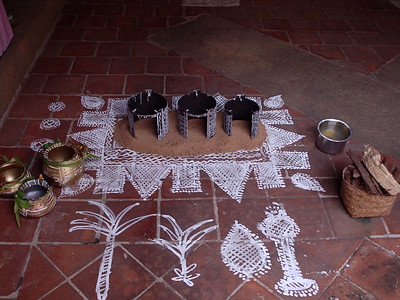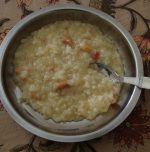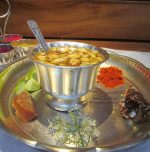Pongal Traditions

Pongal is a harvest festival celebrated all over the country with different names. The word ‘Pongal’ represents the boiling over of rice in the cooking pot.
Pongal marks the nature as it is associated with the green fields, crops, cattle, birds etc.
Pongal is celebrated for four days.
Here are some important Pongal traditions:
The first day of the festival is celebrated as Bhogi Pongal. A huge bonfire is lit at the home in which all the waste and useless items like old chairs etc. are burnt. The burning of old and useless things represents the end of old things and beginning of new things. The fire is kept burning throughout the night. Houses are cleaned and decorated with different designs of Kolams with rice flour.
The second day is celebrated as Surya Pongal. New rice is cooked in a new mud-pot. The rice is mixed with jaggery and milk. It is called ‘Pongal’. It is allowed to spill over as it symbolizes riches. The Pongal is offered to the Sun God with sugarcane sticks. It is believed that on this day Lord Sundareshwar performed a miracle in the Madurai temple. He breathed life into a stone elephant that ate sugarcanes which was depicted on the walls of the Meenakshi temple.
Third day is celebrated as Mattu Pongal. It is dedicated to cattle. Cows and bulls are washed and dressed in a beautiful way. Their horns are painted and covered with shining metal caps. Tinkling belles are tied around their neck. People touch the forehead and feet of their domestic animals. They also bow in front of them. These animals are fed the pongal. In some areas, girls make colored balls with cooked rice and feed them to birds and crows which is supposed to bring happiness to their brothers.
The last day is celebrated as Kaanum Pongal. People visit their friends and relatives. They leave a small portion of food on banana leaves for the birds. Some food is left for the crows. Pongal songs and dances are also Pongal traditions.
Image Credit:- “Pongal Kolam” by Alagu is licensed under CC BY -SA 2.0.
Image Reference: https://www.flickr.com/photos/allagappan/2202895737/









Leave a Reply